People's Media
You want to bet that kids are vainly Googling the African nation of Wakanda now?
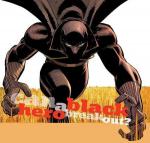
Google no further: The fictional country and its native super-metal are found only in Marvel's new monthly "Black Panther" series. Its launch during Black History Month, along with Seattle publisher Fantagraphics' graphic novel biography, "King," prompts a thought balloon: Why haven't there been more comics by and about minorities?
Autonomous comic lab
"Every 50 or 100 years, people say, 'Look they've got all these great resources. Let's try to take it from them.' Now there's an international coalition of the greedy out to invade Wakanda, and the latest Black Panther is barely in his throne."
This isn't Hudlin's first foray into comics and race. He co-wrote last year's superb "Birth of a Nation" with Aaron McGruder, controversial cartoonist of "The Boondocks," about the secession of East St. Louis. It's renamed "The Republic of Blackland" and bases its national anthem on the theme from "Good Times."
Here's how he imagined Black Panther's homeland: "How would they have this great super-science? You do a little research and you find that some African tribes had these metal alloys while people in Britain were still living in caves. What if their libraries never got burned, they never got knocked off track in terms of their cultural advancement? They could only maintain that by being one of the most fierce warrior tribes on earth. Look at the Vietnamese. They beat the Chinese, the French, the Americans. You can't really explain why, other than that they're just a bunch of kick-ass people."
To Hudlin, longtime Marvel writer and editor Lee and artist Kirby were like Lennon and McCartney. "All these things were there in the character as created by Stan and Jack, and what I'm doing is just taking some of the implied ideas and making them explicit. This is sort of a relaunch. And the thing about these characters is, you really have to write them for two audiences. There's people like myself with 30 years of continuity in their heads and all this minutiae."
Also, Hudlin says, "I really want this to be a lot of people's first comic book."
For some black readers, it may be.
"It's a real white-bread industry," says Gary Groth, editor of The Comics Journal and co-founder of alternative publisher Fantagraphics.
The publisher is home to perhaps the only long-running title by and about minorities, Jaime and Gilbert Hernandez's "Love & Rockets," which started in 1982. Marvel has begun a big push for its new Latina spider-heroine, Araña, but Seattle retailers report that those issues haven't been flying off their shelves.
One possible reason why there haven't been more minorities in comics is obvious. Groth figures: "The comic reading public is probably mostly white, middle class." As for mainstream comics and superheroes, Groth says, "The experience is so bland and generic and massified, most of the black people who work in comics, you couldn't tell the difference in their work if they're white or black."
Humanizing King
"King" writer and artist Ho Che Anderson's viewpoint shows the chicken-and-egg circularity to the minority question in comics: "I can only suggest maybe not having grown up seeing themselves in the art form, not too many black folks consider it as something they want to do."
His densely worded but engrossing biography of Martin Luther King Jr. reads like a modern-day Classics Illustrated for adults with harsh language and the civil-rights leader's personal foibles left unsanitized. Anderson says his approach got him a cease-and-desist letter from the King estate years ago (the story originally appeared in three installments beginning in 1993), "But I don't know what happened to it."
From his Toronto home, Anderson, 35, says, "The basic approach was an attempt to demystify and humanize him to a certain extent. My personal feeling is that it's hard to relate to icons, but it's easier to relate to people who possess flaws like the rest of us. It also leads you back to the inescapable conclusion that the man was truly a hero.
"I'm just trying to be frank in there about his faults and some of his escapades on the road," Anderson explains. "But they're given no greater weight or credence than anything else in the book."
He's just as frank about getting the "King" assignment from Fantagraphics: "It was kind of an effort to cover their own ass by getting a black cartoonist to tell the story."
The lack of color in mainstream comics hasn't been for lack of effort. Recalling DC Comics' now-defunct "Milestones" line of black-themed titles in the '90s, Anderson says, "I guess it always comes down to economics, what sells. I was involved in 'Milestones,' but it kind of died out because the quality wasn't always there."
Good stories count
"That was one of the ways we were trying to build a stronger and more ethnically diverse DC universe," says DC's editorial vice president Dan DiDio. But, he points out, "From that group came 'Static Shock,' and if I'm not mistaken, that's one of first African-American comic books spun off into cartoon — a very prestigious one." (It's part of the "Kids WB" lineup.)
DiDio doesn't dispute that it's a white-bread industry. "But a lot of people are working hard to change that as we speak," he says. "We're getting a lot more diverse characters, but also a lot more diversity of creators in the business. Each one of our super teams has an African-American character in it. Green Lantern in the 'Justice League' cartoon is John Stewart [not the white Hal Jordan of the comics]. Firestorm has been relaunched as new black character."
DC's first black character in a solo title fared similarly to Marvel's Black Panther. In 1977, "Black Lightning" lasted a scant 11 issues. One lesson learned since then: Adding color isn't enough if you're not also telling a good story.
"We reintroduced Black Lightning to The Outsiders," another super team, DiDio says. "It's not just about a character being black but about him being a father, being a hero, and having a daughter following in his footsteps, and her doing things he disagrees with."
-
-
Uganda Child abusers
People's Media:
This week a policeman "spokes person of LRA" Brig. Kolo, was warmly welcomed back as a hero by the uganda state. The Ex Policeman killed thousands of ugandans mostly children and defenceless women in cold blood.
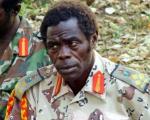
The uganda killers have promised the ex-copper a glory life that will be paid by taxpayers and the mighty donor community. This sad drama has left many ugandans speechless!
War criminals still at large:

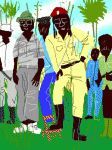
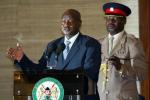
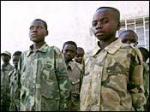
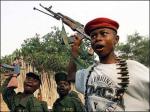
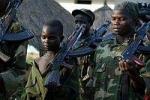


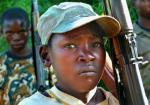
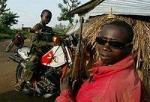
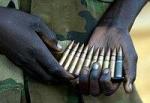
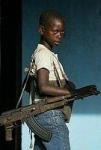
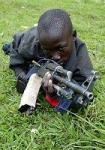

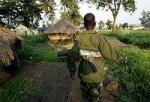
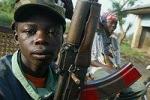
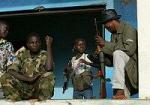
-
Vagina Warriors take on the world
Eve Ensler
Dear Vagina Warriors,
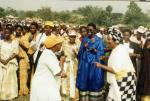
Because of your efforts V-Day, and the spirit, energy and movement to end violence against women and girls, has spread wildly around the world. Last year there were 2300 events, celebrations, in over 1100 cities, villages and towns. From Delhi to Detroit women took back their bodies and their lives. I was lucky to be in Mumbai where I witnessed the extraordinary humor of a brilliant Indian cast performing “The Vagina Monologues” for hundreds and raising money for a local shelter. I was there in Tulsa, Oklahoma performing for 2500 Native Americans so that women there would be safe and free. I was there when 7000 people from all over the world marched on Juarez, Mexico and insisted that there be justice for the hundreds of disappeared women and safety for the living.

We have had huge victories. Our Agnes Pareiyo*, was elected Deputy Mayor of Narok, Kenya. V-Day Europe** was born. A young girl from the Anti-Rape Dolphin program in the slums of Nairobi, Kenya successfully fought off her rapist. A teenager brought “The Vagina Monologues” to her high school and the community stood behind her. Women made vagina cookies for their benefit in Cairo, Egypt. The list goes on and on.
Each one of these individual victories has begun to break through the wall of denial, shame, and secrecy that surrounds the seeming inevitability and acceptability of violence against women.

This year we must go further. We must show how central, how impacting, how contagious, how devastating this violence is to everything and everyone. We must transform our activism into real political power and vision. We must help vagina warriors become vagina leaders. This is the year we must see what we see, know what we know, say what we have to say.

This is the year where we bring V- Day to the smallest villages, into the places of most resistance and need, into our homes if necessary. This is the year where we stand, through our Spotlight, with the women of Iraq who have lost more freedom than they have gained as a consequence of the U.S. war and subsequent occupation. In Iraq where the incidents of rape and abduction by organized gangs has increased fear of sexual violence deterring women from returning to work or seeking employment and families from permitting their daughters to go to school.
This is the year where we end violence against women. Remember, I promised it would happen in 2005? We have a lot of work to do.V-Day is an outrageous, global, personal, anarchic unstoppable movement. There are thousands, if not millions of us. We are everywhere. We have humor, intensity, sorrow, grace, and perseverance. We are having an impact.

Go further. Work harder. Believe deeper. Be bolder. Speak louder.
We will win.
-
Yoweri Museveni is the African genocide machine
Peoples' Media:
Dictator Museveni has since 1997 been involved in the systematic destabilisation of the Democratic Republic of Congo, and the resultant horrific civil war. This involvement continues to this day.As early as 1992 'The Guardian' reported that:

"In the six years since Yoweri Museveni took power, his government has managed to alienate three of its five neighbours. Relations remain good with only Tanzania and Congo DRC." Museveni sparked off Africa's most tragic humanitarian crisis when it subsequently sought to destabilise Congo DRC. In 1997, the London 'Times' reported that "Uganda ... backed an uprising by rebels in eastern Congo DRC who's aim was to drive the Zairean Army from the region and bring down President Mobutu"
In 2001, Human Rights Watch documented this involvement, stating that Museveni had "fuelled political and ethnic strife in eastern Congo with disastrous consequences for the local population."This had included stirring up ethnic violence, murdering civilians and "laying waste their villages."
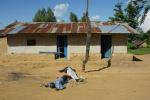
Human Rights Watch had also previously noted that Uganda was responsible for the murder of large numbers of civilians in north- east Congo.This was also confirmed by Congolese human rights organisations.In late 2002, Uganda was subsequently again accused of deliberately seeking to "provoke ethnic conflict, as in the past" - actions which the United Nations warned risked genocide in the region. In July 2003, a Human Rights Watch report, '"Covered in Blood": Ethnically Targeted Violence', stated, for example, that Uganda was involved in the ethnically-motivated murder of several thousand Congolese civilians in the Ituri area of north-eastern Uganda. Uganda continues to arm Congolese gunmen responsible for horrific acts of terrorism - acts every bit as horrific as those attributed to the LRA in northern Uganda. The Museveni regime was also accused of militarily and logistically assisting the UNITA rebel movement in Angola.
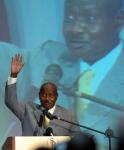
Additionally, the UN has repeatedly stated that Uganda was criminally and systematically stealing Congo's resources. A Human Rights Watch report also noted that Ugandan forces "have blatantly exploited Congolese wealth for their own benefit and that of their superiors at home."
The hypocrisy of Museveni's public bleating about neighbouring states allegedly destabilising his government is clear.
The International Community's Responsibility for Continuing Conflict in Uganda.

The international community itself shares a partial responsibility for the continuing war in northern Uganda. This responsibility is at least two-fold. Western governments continue to project Uganda as a success story when the reality is that it is wracked by political turmoil and Uganda's economy is artificially buoyed by aid. A Refugees International report has observed, for example, that according to one estimate donors provide about 53 percent of Uganda's budget. They also cited a UN official as saying: "[D]onors don't want to portray Uganda as another African country that is going down the drain. Because they give so much to Uganda, donors have a political motivation to make sure that it is seen as a success story."
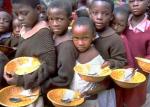
This pretence ignores, in addition to the conflict in northern Uganda, Museveni's responsibility for the deaths of millions of civilians in Congo. The international community, by facilitating a military rather than a peaceful solution, also bears a direct responsibility for prolonging conflict.
A UN news report, for example, has noted: "Some aid agencies working in the north have criticised the international community for allowing Museveni's government to keep the humanitarian crisis in the north on the back burner ... For example, they have expressed concern over the government's recent decision to re-allocate 23 percent of funds from other ministries to defence, seen by some as indicating a preference for a military solution over a peaceful settlement in the north."

We call upon all our friends around the world to publish the crimes of Yoweri Museveni and also educate their local communities about the african Polpot.


